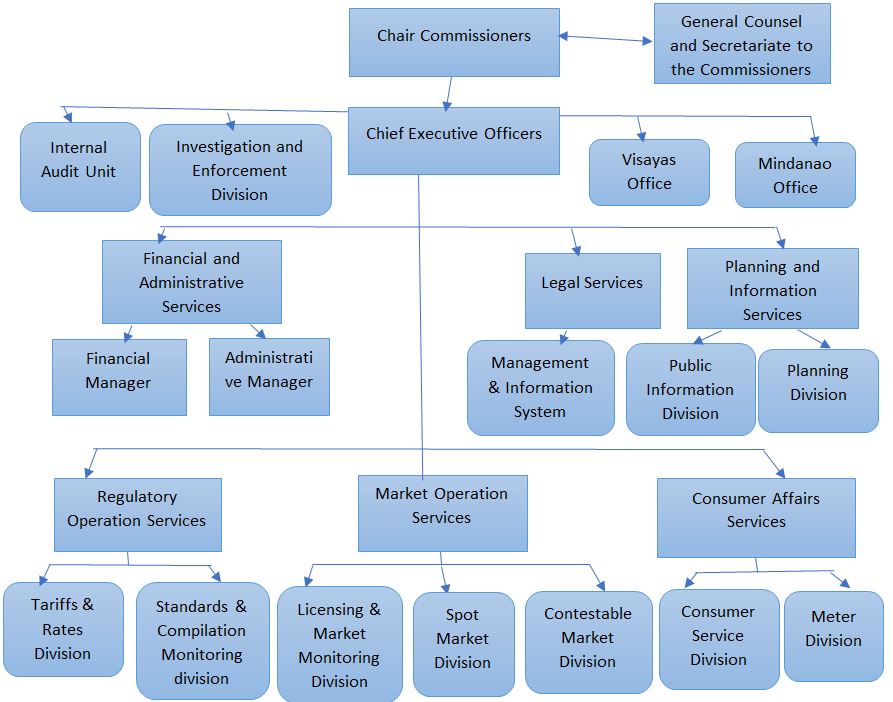Introduction
Royal Dutch Shell is an oil production company that provides services globally. The company’s management have different ways of communicating to their subordinates, personnel as well as customers. Chair commissioners are the head of the company where their main duty is to give go ahead on the implementation of a newly identified and analyzed idea. Chair Commissioners are the first in command in Royal Dutch Shell Company. The Chief Executive Officers or Directors receive orders from the chair commissioners who pass their information to the executive officers through the General Counsel and Secretariate. The communication is then pass to the individuals or personnel that are under the Chief Executive Officer who gives order to the Internal Audit Unit, Investigation and Enforcement division, the Visayas Office, Mindanao office, Financial and Administrative office, Legal Services office as well as Planning and Information services office. The communication then break down from the financial administrative and planning information offices to Market Operation manager, Regulatory Operations Services manager as well as the Consumer Affairs manager.
Discussion
The third level of communication process involves the market operation manager, regulatory operations services manager and consumer affairs manager. These three managers finally pass the information from the Chair commissioners to the consumers as well as the last level of personnel in the company’s hierarchy of communication in the company’s operations. The analysis shows the chain and nature of communication which is mostly covering the vertical and horizontal communication in the company. Therefore, the communication starts from the first level of hierarchy which is the Chair Commissioners and ended in the last level of the hierarchy which involves the last group of personnel as well as the consumers.
Reasons for the Flow of Communication in Royal Dutch Shell Company
The company had to restructure its operations based on the change from a geographical structure to a primarily business sector-based structure. The company planned to eliminate over 1,000 corporate positions during time of planned change which involves the redesigning of its coordination system and control in the entire company’s operations. The planned change came after the realization that Shell will need to have a different way of doing its business for the purpose of retaining its position as the world’s largest turbulent industry environment, energy and chemicals company as compared to other companies (Bennett, 2021). This planned change is believed to reduce the head office cost which will then lead to the increase of control and coordination that helps in managing and controlling cost, focus capital expenditure as well as pruning the business portfolio.
The communication flow in Shell company has exerted some effects on the personnel as well as the company’s operation. The first effect brought by the communication is stress in the work place. This is because the employees are given a lot of pressure when the head of the company gives out a task to be worked on by the personnel within a short period of time. This leads to frustration on the lives of employees which might make them begin feeling guilty or even experience home conflict with their loved ones due to the tress they carry along with them from work. The second effect is unmet needs and expectations. This is experienced as a result of missing deadlines by the personnel due to the limited time that might have been issued out by the leader. The third effect is arguments and other relational breakdowns (Bennett et al, 2018). The communication flow in the company has brought poor communication skills where personnel can only open an email inbox or find a message from a colleague which might be considered as accusatory to the person. This might lead to anger or frustration by the person and since the sender might be from another level or department in the company, then the person might not be able to confront the colleague.
Conclusion
The flow of communication does prevent crisis in the company’s management where it provides an efficient and official form of communication amongst the leaders and personnel. The crisis that might involve the Shell as an oil company could be a customer complaining about the high prices for natural gas and petrol towards the protest made by the environment group (Carr, 2020). The communication flow can prevent such a crisis where the complains can easily be handled by the consumer services division where the issue will be addressed in an efficient manner.

Reference
Bennett, W. Lance (2021). The disinformation age: Politics, technology and disruptive communication in the United States. New York, 97(1), 34-45
Bennett, W. L., Pfetsch, Barbara. (2018). Rethinking Political Communication in a Time of Disrupted Public Spheres: Journal of Communication, 68(2), 243-253
Carr, C. T. (2020). CMC is Dead, Long Live CMC! Situating Computer Mediated Communication Scholarship Beyond the Digital Age: Journal of Communication, 6(1), 11-25